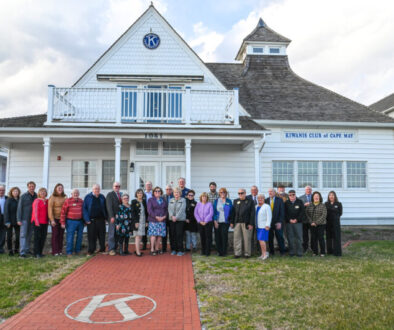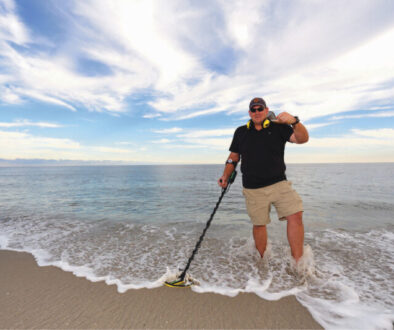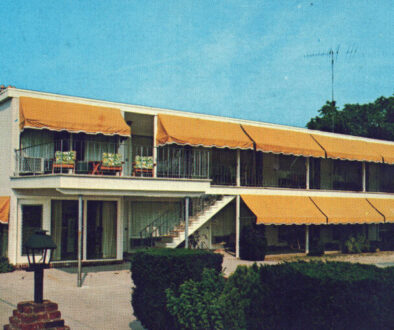Cape May Bird Observatory Northwood Center

If you’re not one of the 45 million Americans estimated by the U.S. Fish & Wildlife Service to be active birders, you may not realize how much avian activity there is in Cape May County. In fact, birding has increased nationwide, spurred on by an uptick in outdoor activities during the Covid pandemic. The Garden State in particular, conveniently located between the cities of Philadelphia and New York, is a hotspot for birding activity.
“New York and Philadelphia are two places that have had long histories of natural history research, with the American Museum of Natural History in New York and the Academy of Natural Sciences in Philadelphia,” says Brian Moscatello, Sales Manager at the Cape May Bird Observatory Northwood Center in Cape May Point. “The Delaware Valley Ornithological Club, one of the oldest birding clubs in the nation, has met at the Academy of Natural Sciences since shortly after its founding in 1890.”
It’s not just proximity to other naturalists that makes Cape May so compelling for birders—it’s also that Cape May sits at a crossroads of migration routes. Cape May stands out as a pivotal point for migratory birds, attracting hawks, songbirds, and enthusiasts from far and wide, making it a spectacular hobby for just about anyone visiting the Jersey shore.
“Some people are fortunate enough to start birding as children…it can become a lifelong hobby,” says Moscatello. “It usually does. And if you start younger, you’ll learn faster.”


For those who think of birding as an older person’s game, think again. As the 41st anniversary of the World Series of Birding approaches, over 70 teams—many of which are youth teams—are readying themselves for a spirited competition of birding. “We have different youth divisions like lower elementary, middle school, and high school, and each division can win their own prizes,” explains Moscatello.
There’s been a concerted effort to ensure that no one feels left out of the pastime. “There’s more of a movement nationwide, something called birdability, which is a focus on making birding locations accessible to people of all abilities, including wheelchairs and so forth,” says Moscatello. “So that people can get to where the birds are and enjoy the outdoors and nature regardless of their personal mobility issues.”
The Cape May Bird Observatory serves as a nexus for birding activities, offering guided walks, advice and suggestions, and educational programs. And it has a store dedicated to all your birding needs.
“It used to be, we’d say that all you need [for birding] are a pair of binoculars, a field guide, and a notebook,” says Moscatello. “And that’s largely true today.”
The Cape May Bird Observatory Northwood Center focuses largely on sports optics—not the hunting side of things, but the binoculars, spotting scopes, and tripods. There’s a vast selection of binoculars and scopes ranging in price from $70 to over $3000, which could be intimidating for new birders if not for the friendly expertise of people like Moscatello and his staff, who can recommend sports optics in terms of function, image quality, and more.

“We try to encourage people to get something that actually works for nature,” says Moscatello. “It’s just like in photography, or bicycles, or golf clubs. You’ve got your good, better, best, and premium. Very few people start at the top. It’s great if you can start in the middle because you’ll get something that really works well and could work for years.”
If you don’t have the luxury of stepping into the physical store, check out Feathered Edge Optics, the Observatory’s online store, which also has an extensive collection of binoculars and scopes, with some ‘need to know’ information from Moscatello.
“Binoculars are pretty straightforward. The first number on every binocular on earth is the magnification. The vast majority of people watching birds are using a 7 or 8 or 10 power binocular,” says Moscatello. “The second number is the size of the front or objective lens that gathers the light in millimeters. But the best binoculars not only perform better in terms of resolution and color and brightness but also ergonomics, how they feel in the hand, how fast they can focus and how durable they are.”
While premium binoculars from brands like Swarovski, Zeiss, and Leica may be the ultimate experience (and price) in birding, there are some much more affordable options that are a good value for the money and can last through your formative birding years, particularly the Nikon Monarch M5 and Vortex Diamondback HD, both of which have models for under $300.

“They’ve just stood the test of time,” says Moscatello. “We’ve probably sold a thousand Monarchs over the last decade or so.”
It’s not just optics at Cape May Bird Observatory Northwood Center, it’s everything you might need for birding, and then some, from Rite in the Rain waterproof notebooks, pens and pencils, and field guides, to Cape May Observatory and New Jersey Audubon logoed shirts, hats, and binocular straps. There are also bird feeders, bird houses, and accessories for those things; natural history books; postcards and note cards; consignment art from several different local artists, from postcard-sized prints of birds and mammals to larger things you’ll want to get framed; as well as nature themed jewelry from small artists as well as from Jabebo, a Pennsylvania-based company that makes earrings of anything in nature from recycled cereal boxes.
“We always try to have some little gifty items too because all summer long we’re getting families who just see the light on or heard about Cape May Bird Observatory or birding and are just curious,” says Moscatello. “So, we try to have something for everybody as far as we can in a small store.”
There’s plenty to buy at Cape May Observatory Northwood Center, but what is perhaps their greatest offering is actually free.

“We’re a store and gift shop, and all of the sales are designed to help support the mission of research, migration, monitoring, and conservation,” says Moscatello. “But we’re very much an information center for the birding and nature community.”
From answering the often asked “where do we go to see…” to providing information on walks, camps, and events—many of which are free or low cost and hosted by NJ Audubon and the Cape May Observatory—the store is as much a retail outlet as a hub of connection and community among birding enthusiasts. Moscatello will happily guide visitors to the Merlin Bird ID app and eBird app, both from Cornell Lab of Ornithology, so they can record and track birds digitally instead of by paper; point them towards festivals and boat trips to see pelagic birds; and of course, guide bird walks.
Cape May Bird Observatory Northwood Center is open to birders of all ages and levels. From birding festivals like the Cape May Spring Festival, where seasoned birders travel to take part in Cape May birding, to daily walks full of everyone from experienced to first-time birders who need to borrow loaner binoculars, this is a community that’s very much open to members joining their flock.



